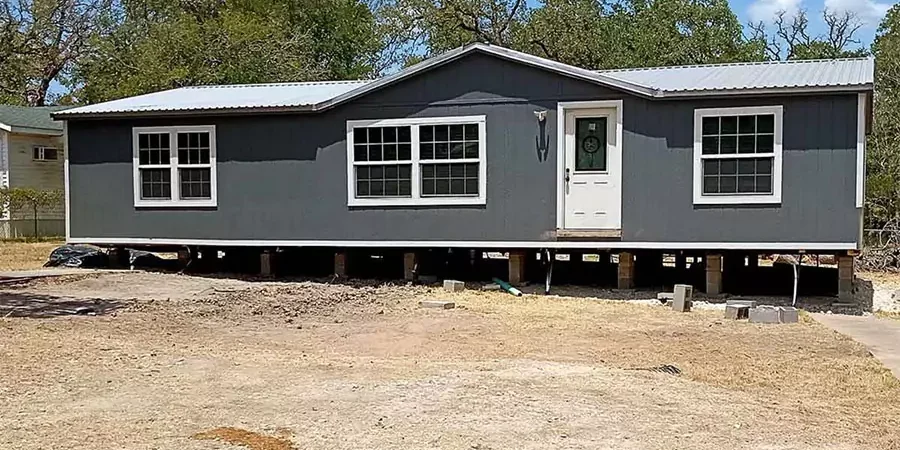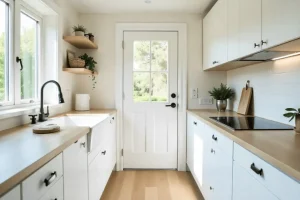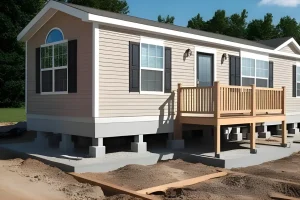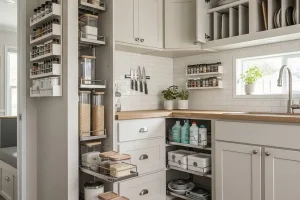If your mobile home feels tilted or your doors keep sticking, you might need a relevel. And no, your house isn’t trying to do tricks—it just needs a little help getting balanced again.
Releveling is all about making sure your manufactured home sits flat and comfy on its pad or pier system. It’s a smart move to keep your home safe, strong, and feeling normal again.
But what’s it like to bring in licensed mobile home contractors near OC for this kind of job? Don’t worry, we’re breaking it down so you know exactly what’s going on from start to finish. Let’s take a look at the usual questions folks ask before getting mobile home services like this done.
Why Would My Mobile Home Need Releveling?
Sometimes mobile homes shift over time. It’s just part of the deal when you live on soil that moves with weather, water, or just plain old gravity. You will need releveling if you notice the following:
Uneven floors: If you feel like you’re walking uphill just to get to the fridge, that’s a clue.
Sticky doors and windows: If they don’t close right, your house may be leaning a bit.
Visible gaps: Look at your skirting or siding. Gaps could mean your home has shifted.
Squeaky or bouncy floors: That trampoline feel? Not supposed to happen indoors.
How Does a Contractor Relevel a Mobile Home?
A mobile home contractor in Southern California, like Cal Star Mobile Home Construction, will inspect your home and make sure it’s sitting just right on its support system.
Here’s what usually happens:
- Inspection – The contractor checks if your home is off-level using tools like water levels or lasers.
2. Adjustment – The piers or pads under your home get adjusted, added to, or reset.
3. Tightening – Metal straps, bolts, and anchors get tightened to secure everything.
4. Re-checking – Once everything is leveled, the contractor double-checks to make sure it stays put.
This job usually takes a few hours, but it can take longer depending on how off-balance things are.
What Should I Look for in a Mobile Home Contractor?
When you’re hiring a mobile home contractor, you don’t want just anyone crawling under your house. You need someone with the right tools, knowledge, and a proper license. Look for a licensed C47 contractor, which means they’re approved to work on manufactured homes in California.
It’s also smart to choose someone with years of experience, so you know they’ve handled all kinds of homes, not just one or two. A contractor who specializes in mobile home services will bring the quality craftsmanship needed to do clean, sturdy work that holds up over time.
Be sure they offer a free estimate too, so you’ll know what you’re paying before they start digging around. Most importantly, choose a specialist in mobile homes, since not every general contractor understands how manufactured homes work.
Will My Mobile Home Be Damaged During the Process?
Not at all! A proper relevel should protect your home, not harm it. Leaving your home tilted could cause more damage over time.
Plumbing: Pipes can crack or shift if your home isn’t level.
Floor damage: A leaning home might lead to saggy or broken floors.
Cracked walls or ceilings: Uneven pressure can cause cracks to show up inside.
How Much Does Releveling Cost?
The cost to relevel a mobile home can vary, but most jobs in the Southern California area—including Orange County—typically range from $800 to $2,500. The final price depends on a few key things. For starters, it matters how far your home is off-level and what kind of support system you’re working with. Homes sitting on piers, pads, or blocks can each come with their own set of challenges when it comes to access and labor.
Some contractors may charge a fee for a full inspection, especially if travel is involved or if extra time is needed to assess deeper issues. If your piers or pads are cracked or damaged, that’s another cost to factor in, since they’ll need to be replaced.
Your location also affects pricing—Orange County rates might be higher than nearby areas like Riverside or San Bernardino due to demand or travel.
How Often Should I Relevel My Home?
You don’t need to relevel your home every year, but it’s smart to have it checked every so often. Most homes should be inspected every 3 to 5 years to make sure everything stays balanced. If there’s been a big storm or earthquake, your home might shift slightly, which can throw things off-level.
And of course, if you notice bouncy floors, sticking doors, or cracks in the walls, it’s probably time to call in a pro. Regular checks help keep your home solid, safe, and standing strong.
Can I Live in My Home During Work?
Yes, you can stay inside while the releveling is happening. The work takes place underneath the home, so there’s no need to move out or cover everything in plastic. It’s a minimal disruption, so your furniture, TV, and daily routine can stay right where they are. Most revealing jobs are finished in a single day, and professional contractors make sure the process is safe and smooth from start to finish.
Do I Need Permits or Inspections?
Sometimes you do. It depends on where you live and the type of work being done.
Local rules: Some counties require inspections after major work.
HUD-approved housing: If your home is HUD-approved, there might be extra rules.
Decks or add-ons: If your mobile home has a deck or accessory dwelling unit (ADU), those may need checking too.
Can Releveling Help My Home Last Longer?
Absolutely. Releveling isn’t just about comfort—it’s about keeping your home in good shape.
Better weight support: A level home spreads the weight evenly, protecting your frame.
Protects utilities: Pipes, HVAC systems, and wiring stay in place.
Prevents sagging: Keeps floors flat and stops damage from pressure or movement.
Think of it like a tune-up. It helps your mobile home stay solid for years.
When I noticed my mobile home in Mission Viejo, Orange County, starting to feel a little off—creaky floors and uneven surfaces—I realized it might be time for a releveling. I wasn’t sure how much of an impact it would make, but after contacting Cal Star Mobile Home Construction, I quickly learned how important it was.
The team explained that releveling isn’t just about comfort—it’s about ensuring my home stays in good shape for the long term.
They told me that a level home ensures better weight distribution, protecting the entire frame and preventing unnecessary strain on the structure. It also protects critical utilities like pipes, HVAC systems, and wiring by keeping them in place and preventing damage.
Most importantly, releveling prevents sagging, which had started to show in some areas of my floor, by stopping damage caused by pressure or movement over time. After releveling, my home feels solid again, and I feel much more confident in its long-term stability.
Jennifer, Mission Viejo
Conclusion
Living in a mobile home comes with its own set of perks—and a few quirks. Revealing is one of those jobs that helps keep things in balance (literally). Whether your home is on private land in Orange County, leased land in Los Angeles, or somewhere out in Riverside, it’s smart to bring in the pros. If you want to stay ahead of potential issues, it’s worth reading our blog on essential mobile home maintenance tips for Orange County homeowners, where we cover key upkeep practices that can save time and money in the long run.
Cal Star Mobile Home Construction specializes in mobile home repair and remodeling services. They’ve worked with all kinds of manufactured homes across the Southern California area. Whether you’re dealing with a slanted floor, a sticky door, or a new manufactured home setup, their team is ready to help.
Need a free estimate or just have questions? Give Cal Star Mobile Home Construction a call today and get your home back on level ground—with solid craftsmanship and good people. As your trusted mobile home contractor, we’re committed to providing reliable and quality service to ensure your home is stable and well-built for years to come.
Frequently Asked Questions
1. How do I know if my mobile home is off-level?
If your doors don’t close right, your floors creak a lot, or your walls have cracks, your home might need releveling.
2. How long does releveling take?
Most jobs take a few hours to a full day. It depends on how bad the issue is and what repairs are needed.
3. Can I do releveling by myself?
It’s best to call a professional mobile home contractor. Releveling takes special tools and training, and doing it wrong can make things worse.




